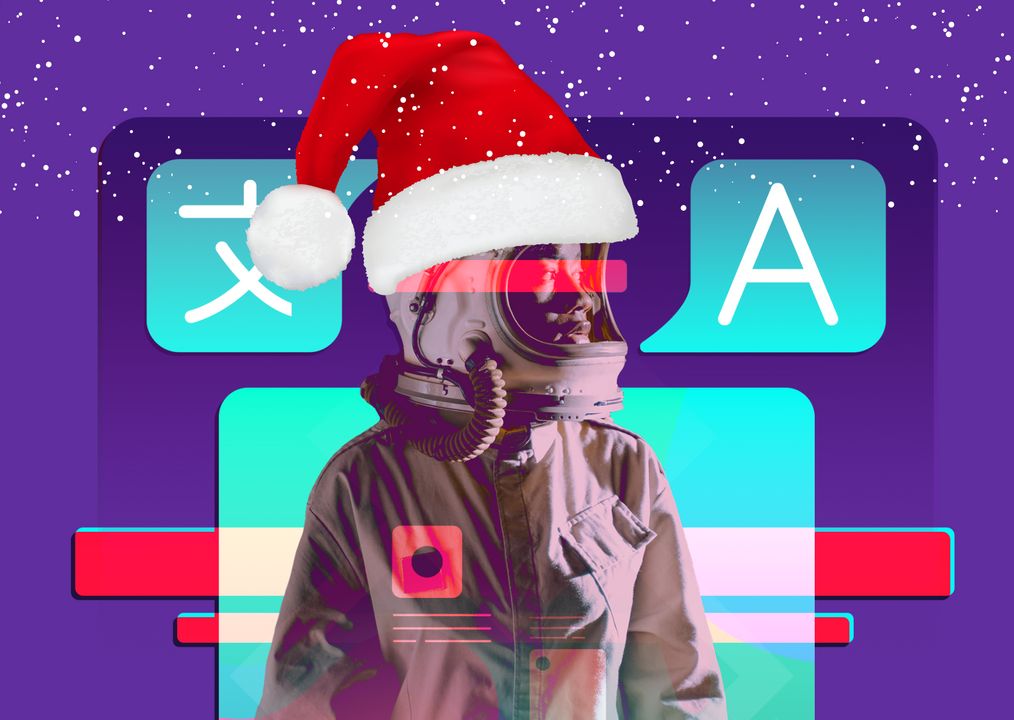alugha goes podcasts
Thanks to alugha, it is now possible to listen to podcasts, to enregister them as well as to trancribe and to multilingualise them
How to launch a Christmas campaign in over 100 languages

Read this article in: Deutsch, English, Français, Italiano
Estimated reading time:7minutesAuthor: Bernd Korz, founder and managing director of alugha GmbH (https://alugha.com)
The fact that Christmas business is the most lucrative time of the year for online retailers all over the world is not a matter of belief. In Germany alone, e-commerce sales increased by 15.8 percent to 20.1 billion euros between the beginning of October and the end of November 2021. Although they have been rather restrained since then (compared to previous years) due to economic developments, this is just one more reason to particularly push the year-end sales this year. In the process, new target groups and markets - at home and abroad - can be targeted with multilingual campaigns.
Most Christmas campaigns by German e-commerce companies are only implemented in English and German. Given the number of people in Germany who only speak German as a second language, new approaches to multilingual campaigns are quickly emerging. The idea is that target groups are more likely to click on an advertisement or content in their native language. In addition, migrants living in Germany also use their browsers in this language. Which means that only corresponding search results are displayed. This in turn is exciting for online marketing. According to the Federal Statistical Office, the most commonly spoken foreign languages in German households are Turkish, Russian, Polish and Arabic. Currently, however, advertising campaigns in Ukrainian could also be interesting.
For online business that already takes place across Europe or worldwide, automated translation is also a suitable tool to boost Christmas business. For example, e-commerce companies that already know their target group abroad can conduct an A/B test with Christmas advertisements in English and the native language of the users. Companies that offer little or no services or products abroad can use a multilingual lead campaign to feel their way into possible target countries.
Multilingual campaigns hold enormous potential for increasing the reach of content and expanding the target audience. Considering that there are over 7,000 spoken languages and dialects worldwide, e-commerce is on the verge of a veritable marketing revolution. The Christmas season is the perfect opportunity for online retailers to increase the reach of their content and thus tap into new target groups. After all, what would happen if this year's Christmas campaign were to run in 100 or even 200 languages? It's possible because the use of artificial intelligence can open up completely new possibilities in both B2B and B2C marketing: It is now possible to capture and translate information in real time using neural machine translation (NMT). Those who use an intelligent tool can transfer their campaigns into several languages within a very short time.
Customer feedback - such as click numbers - shows in which language interest is particularly high. Online merchants who provide a global audience with access to their content automatically receive a kind of organic market study on the preferred language of their recipients. With this knowledge, future campaigns can be designed in a more targeted manner and directed even more individually to lucrative target groups. And especially in the run-up to Christmas, personal and emotional messages generate numerous clicks and viral effects. Video and audio content in particular is popular for marketing campaigns and ads. But here, too, it is possible to translate audiovisual content within a few minutes using AI tools. Even email campaigns benefit from intelligent translation solutions or personalised links that redirect recipients directly to a multilingual landing page or even to one in the appropriate language.
Only very few e-commerce companies have the resources to regularly hire several translation agencies in order to always be able to operate multilingually. Even for a single Christmas campaign, the costs quickly exceed what is feasible for many online retailers. With automated translation tools, however, they can translate their advertising messages easily and quickly. A clever mixture of AI and human translators ensures that the audiovisual content is output in the respective recipient or browser language.
If you want to be competitive this year, you should take a closer look at the "concept of Santa Claus" and think more globally. Tapping into foreign markets and target groups of other languages can give this year's Christmas business a powerful boost. It is also a welcome starting point to think outside the box with multilingual campaigns and attract new clientele.
Advantages of multilingual Christmas campaigns
Potential buyers are more easily convinced of a product in their native language.
Content with multilingual transcripts and subtitles is inclusive of hearing-impaired or deaf people.
Online retailers expand their market beyond their own country and language borders.
Conversions increase due to a better emotional and linguistic connection.
Valuable data provides detailed insights into foreign target groups.
Author Profile
Bernd Korz is the founder and managing director of alugha GmbH, which was founded in 2014 and is based in Mannheim. The software company specialises in providing multilingual video and audio content using artificial intelligence methods and translation teams around the world. As a studied structural engineer, Bernd Korz began producing explanatory videos for YouTube in 2008. To enable users to switch languages easily, he developed a feature together with his son - the forerunner of today's translation platform alugha. Bernd Korz is considered one of the leading experts for AI-based translations. In addition to data security, his professional focus is on the perfect interaction between humans and artificial intelligence.

Thanks to alugha, it is now possible to listen to podcasts, to enregister them as well as to trancribe and to multilingualise them
Podcasts enjoy great popularity. However, you still don't find transcripts for them that often. But why do you actually need a podcast transcript? And how do I create one?
The year 2023 has started and the alugha team wishes you a happy, healthy and successful new year. We also have a tip for you: start your year multilingually!